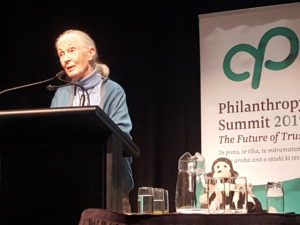The Philanthropy Summit, held in Wellington from May 15 – 17 and created by Philanthropy New Zealand, was one of the best learning opportunities I have had in a long time. Here are the top four things I learned:
- There is a curious and delightful parallel between dental health and a racism-free world. One of many gems from Vu Le’s treasure trove of a presentation was this thought: we know dental hygiene is an ongoing process, so every day we brush our teeth. And if someone points out that we have parsley stuck in them, we say thanks and rush to the nearest mirror to deal with it. So let’s take a similar approach to overcoming racism – working on it personally as an ongoing process, and welcoming feedback. Here’s Vu’s delightful post on the subject, which in turn has a link to Jay Smooth’s great TED talk.
- The typical affluent investor will dramatically underspend their wealth. In other words, many of us can be much more philanthropic than we think. Philip Stevenson from Bloomsbury Associates shared his modelling which shows that many financially-comfortable families significantly over-estimate how much they need in retirement. This means missing out on the joy of giving while living, and also often results in more wealth than may be needed – or even wanted – being inherited by their beneficiaries. How much better then to prudently plan your future, calculate the likely surplus and then use that surplus for philanthropy?
- We need all hands on deck right now to address climate change and other environmental challenges. Speakers like the legendary Dr Jane Goodall and our very own Rod Oram stressed the short window we have to address crises like climate change, species extinction, and

Inspiration from Dr Jane Goodall healthy water systems. “How is it,” asked Jane Goodall, “that the most intelligent species to ever walk this earth is attempting to destroy its own home?” Her conclusion is that this stems from a disconnect between head and heart, and an irrational assumption that unlimited economic growth is possible on a finite planet. In response to this call to action from Jane and Rod, a challenge was made at one of the environmental workshops for all philanthropic funders to commit at least 20% of funding to environmental causes.
- We can help undo colonialism. Ani Mikaere asked whether philanthropy should should try to dismantle colonisation rather than simply trying to ameliorate the harm it has caused. There are wrongs to be redressed (for example, that Māori net worth is on average half that of other New Zealanders), and opportunities to be unlocked (for example, learning indigenous models for caring for the planet and each other), so this is a challenge to be embraced. Some of Ani’s practical suggestions included funding advocacy for creating a society built on the Treaty of Waitangi, supporting constitutional review and change, avoiding being prescriptive in how our funding is used and trusting Māori to lead the initiatives we fund.
I’ve been attending Philanthropy NZ conferences for many years, and they are always great, but this one was the most upbeat, insightful and challenging conference so far. Thank you Philanthropy NZ!
This blog was originally posted here by Alliance, a London-based global philanthropy magazine and resource. For another perspective on the conference, see this post from Cheryl Spain at the Gift Trust
Some great insights Kate – thanks for sharing. Dr Jane Goodall and Ani Mikaere are both on point!